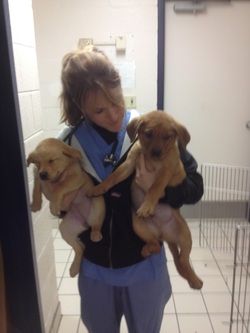
At what age should I start my puppy or kitten getting vaccines?
We recommend at 6 weeks of age or 2 lbs (whichever comes second) you start vaccines. These need to be given every 2-3 weeks due to the antibodies in the milk your puppy/kitten received from their mother from their colostrum (first milk). Those antibodies protect your puppy/kitten from getting illnesses that the mother is immune to (either from vaccines or exposure) for their first weeks of life. At some point between 6-9 weeks those antibodies wear off and there is no cost effective way to know exactly what time they wear off. So, to best protect your puppy/kitten we recommend starting at 6 weeks of age.
Boosters are required because your pet is not protected until adequate boosters are provided. The first vaccine (or two) "prime" the immune system and the following booster vaccines allow your puppy/kitten's immune system to respond. We continue the vaccine schedule until they are between 14-16 weeks of age.
LEPTOSPIROSIS
At any age, the Leptospirosis vaccine will need a booster due to it being a killed vaccine and your pet will need a booster of this whenever they are started on this vaccine.
KENNEL COUGH VACCINE/Bordetella
As long as this vaccine is given with another vaccine and your pet is over or around 12 weeks of age, they do not need a booster of it.
We recommend at 6 weeks of age or 2 lbs (whichever comes second) you start vaccines. These need to be given every 2-3 weeks due to the antibodies in the milk your puppy/kitten received from their mother from their colostrum (first milk). Those antibodies protect your puppy/kitten from getting illnesses that the mother is immune to (either from vaccines or exposure) for their first weeks of life. At some point between 6-9 weeks those antibodies wear off and there is no cost effective way to know exactly what time they wear off. So, to best protect your puppy/kitten we recommend starting at 6 weeks of age.
Boosters are required because your pet is not protected until adequate boosters are provided. The first vaccine (or two) "prime" the immune system and the following booster vaccines allow your puppy/kitten's immune system to respond. We continue the vaccine schedule until they are between 14-16 weeks of age.
LEPTOSPIROSIS
At any age, the Leptospirosis vaccine will need a booster due to it being a killed vaccine and your pet will need a booster of this whenever they are started on this vaccine.
KENNEL COUGH VACCINE/Bordetella
As long as this vaccine is given with another vaccine and your pet is over or around 12 weeks of age, they do not need a booster of it.

Why are veterinary clinics so money hungry and expect vaccines to be given with a veterinarian?
Many people like to give their own vaccines over the counter. While there may be protection provided, many veterinary clinics and boarding facilities require vaccine proof from a veterinarian. The reason for this is that veterinary clinic's have licenses that can be revoked if they are not properly storing and handling vaccines. The technicians take extra training and education on where to give vaccines, how to handle them and you get the legal guarantee your animal is protected as much as a vaccine will allow (No vaccine is 100%!). You also get the added bonus of getting the most up to date information if your veterinary clinic is using the most recent advances in vaccine studies!
We, as many places do, require vaccines to be up to date for our boarding animals and those staying for the day or surgeries. This is not to get more money from you. We are happy to accept vaccine records from another veterinarian. It is to have the proof that the vaccine was handled by a licensed individual and if there is a vaccine failure, we can get a hold of the person administrating and vaccine company. It is meant to protect all those animals in our care. Most people would be very upset if we were housing a pet that was carrying a deadly disease and it was transferred around our facility. We do all we can to be sure that our ill pets are isolated and our facility only houses pets that are up to date on vaccines.
Many people like to give their own vaccines over the counter. While there may be protection provided, many veterinary clinics and boarding facilities require vaccine proof from a veterinarian. The reason for this is that veterinary clinic's have licenses that can be revoked if they are not properly storing and handling vaccines. The technicians take extra training and education on where to give vaccines, how to handle them and you get the legal guarantee your animal is protected as much as a vaccine will allow (No vaccine is 100%!). You also get the added bonus of getting the most up to date information if your veterinary clinic is using the most recent advances in vaccine studies!
We, as many places do, require vaccines to be up to date for our boarding animals and those staying for the day or surgeries. This is not to get more money from you. We are happy to accept vaccine records from another veterinarian. It is to have the proof that the vaccine was handled by a licensed individual and if there is a vaccine failure, we can get a hold of the person administrating and vaccine company. It is meant to protect all those animals in our care. Most people would be very upset if we were housing a pet that was carrying a deadly disease and it was transferred around our facility. We do all we can to be sure that our ill pets are isolated and our facility only houses pets that are up to date on vaccines.

Why do you recommend yearly heartworm prevention screenings despite being on heartworm preventatives?
Yearly heartworm testing is not required, but is highly recommended, by our clinic if you have been on prevention and proof of being on prevention. However, the pharmceutical companies will not back their guarantee behind their heartworm prevention, and therefore will not pay for drug failure, without yearly heartworm testing. This is also a way to track an emerging resistant strain of heartworms. We do recommend yearly testing as we also test for exposure to tick borne diseases as a way to help monitor the tick preventatives you are currently using. Please feel free to open the discussion at your yearly visit about annual screens.
Information on heartworm preventatives and the "slow kill" contributing to resistance: http://www.pethealthnetwork.com/news-blogs/a-vets-life/drug-resistant-super-heartworms-force-change-treatment
Information about Incidence of Heartworm in the U.S. Update information: 2013.
https://www.heartwormsociety.org/images/incidence-maps/IncidenceMap2013.pdf
Yearly heartworm testing is not required, but is highly recommended, by our clinic if you have been on prevention and proof of being on prevention. However, the pharmceutical companies will not back their guarantee behind their heartworm prevention, and therefore will not pay for drug failure, without yearly heartworm testing. This is also a way to track an emerging resistant strain of heartworms. We do recommend yearly testing as we also test for exposure to tick borne diseases as a way to help monitor the tick preventatives you are currently using. Please feel free to open the discussion at your yearly visit about annual screens.
Information on heartworm preventatives and the "slow kill" contributing to resistance: http://www.pethealthnetwork.com/news-blogs/a-vets-life/drug-resistant-super-heartworms-force-change-treatment
Information about Incidence of Heartworm in the U.S. Update information: 2013.
https://www.heartwormsociety.org/images/incidence-maps/IncidenceMap2013.pdf

How does my pet get heartworms?
Baby heartworms, or microfilaria are transmitted by mosquitoes to your pets. An infected pet is bitten and then the mosquito allows development in their bodies as an intermediate host and can infect your pet. Even indoor animals only have been diagnosed with heartworms. It is very difficult to ensure no mosquitoes ever come in to contact with your pet, so we recommend heartworm preventions.
Baby heartworms, or microfilaria are transmitted by mosquitoes to your pets. An infected pet is bitten and then the mosquito allows development in their bodies as an intermediate host and can infect your pet. Even indoor animals only have been diagnosed with heartworms. It is very difficult to ensure no mosquitoes ever come in to contact with your pet, so we recommend heartworm preventions.

Can my cat get heartworms?
Yes! Even your indoor only cat. Mosquitoes can get inside the house. Most infected cats' bodies do not allow the baby heartworms to develop into adults, but some do. There is no approved treatment for cats with heartworms, but the more we are testing the more we are finding cats can become heartworm positive. We currently recommend and have Advantage Multi for our feline patients for heartworm prevention (It also covers some intestinal parasites and fleas too!)
Yes! Even your indoor only cat. Mosquitoes can get inside the house. Most infected cats' bodies do not allow the baby heartworms to develop into adults, but some do. There is no approved treatment for cats with heartworms, but the more we are testing the more we are finding cats can become heartworm positive. We currently recommend and have Advantage Multi for our feline patients for heartworm prevention (It also covers some intestinal parasites and fleas too!)

Why should I spay or neuter my pet?
Reducing populations, reducing unwanted behaviors, reducing wander, reducing added costs of C section, health problems, puppy visit litters, finding homes, etc.
That being said, we are happy to work with good, responsible breeders.
We believe developing strong pets comes with PennHip or OFA testing for hip dysplasia and other genetic tests to ensure no genes are being passed on to future generations that are known to be detrimental to a pet's life. Many times these genetic predispositions are unseen in the parents but they can be carriers. We do feel that breeding can be a large expense and try to prepare owners for this. Costs of emergency C Sections must be planned for, along with genetic testing and responsible breeding.
Our Doctors have done genetic testing for many breeds and recommend you work closely with your veterinarian to determine necessary precautions before breeding your pet.
Reducing populations, reducing unwanted behaviors, reducing wander, reducing added costs of C section, health problems, puppy visit litters, finding homes, etc.
That being said, we are happy to work with good, responsible breeders.
We believe developing strong pets comes with PennHip or OFA testing for hip dysplasia and other genetic tests to ensure no genes are being passed on to future generations that are known to be detrimental to a pet's life. Many times these genetic predispositions are unseen in the parents but they can be carriers. We do feel that breeding can be a large expense and try to prepare owners for this. Costs of emergency C Sections must be planned for, along with genetic testing and responsible breeding.
Our Doctors have done genetic testing for many breeds and recommend you work closely with your veterinarian to determine necessary precautions before breeding your pet.

When should I spay or neuter my pet?
This is a decision made per individual pet. We are often now recommending that larger breed animals wait until their growth plates are closed (Can be 1-2 years old until this occurs). Smaller breed animals can be fixed at 6 months of age as many of them are done growing at this time. We will work with you and discuss what is best for your own pet.
Reasons to spay and neuter an animals earlier than recommended would include: undesired behavior changes, undesired heat cycles, and others based on what your goals are for your own pet.
This is a decision made per individual pet. We are often now recommending that larger breed animals wait until their growth plates are closed (Can be 1-2 years old until this occurs). Smaller breed animals can be fixed at 6 months of age as many of them are done growing at this time. We will work with you and discuss what is best for your own pet.
Reasons to spay and neuter an animals earlier than recommended would include: undesired behavior changes, undesired heat cycles, and others based on what your goals are for your own pet.
